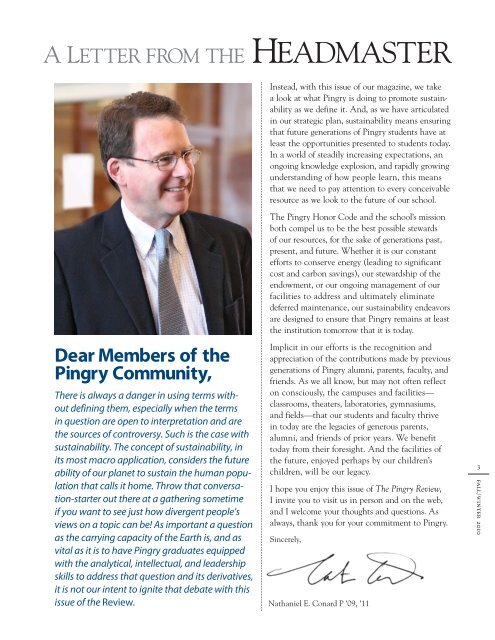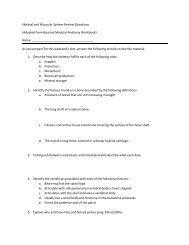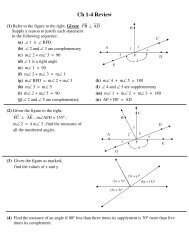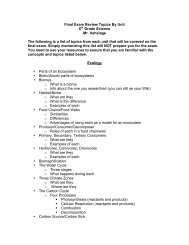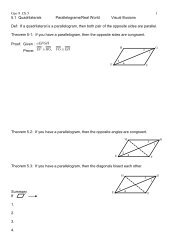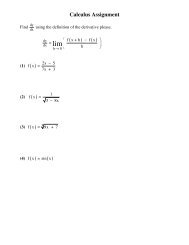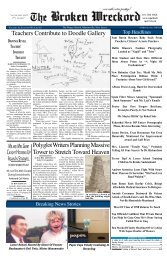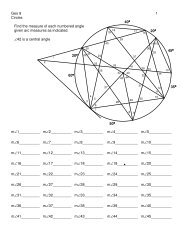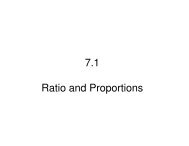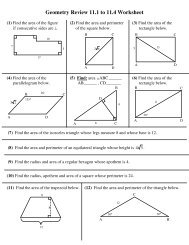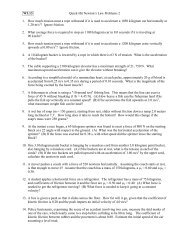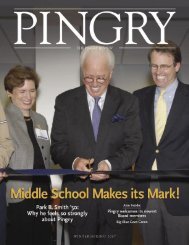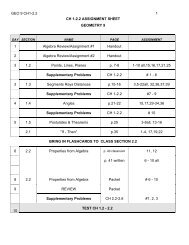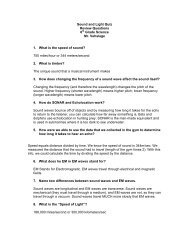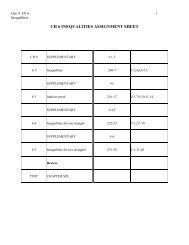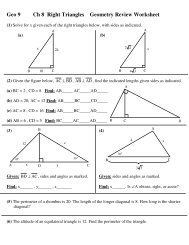Fall/Winter 2010 - Pingry School
Fall/Winter 2010 - Pingry School
Fall/Winter 2010 - Pingry School
Create successful ePaper yourself
Turn your PDF publications into a flip-book with our unique Google optimized e-Paper software.
A Letter from the Headmaster<br />
Instead, with this issue of our magazine, we take<br />
a look at what <strong>Pingry</strong> is doing to promote sustainability<br />
as we define it. And, as we have articulated<br />
in our strategic plan, sustainability means ensuring<br />
that future generations of <strong>Pingry</strong> students have at<br />
least the opportunities presented to students today.<br />
In a world of steadily increasing expectations, an<br />
ongoing knowledge explosion, and rapidly growing<br />
understanding of how people learn, this means<br />
that we need to pay attention to every conceivable<br />
resource as we look to the future of our school.<br />
Dear Members of the<br />
<strong>Pingry</strong> Community,<br />
There is always a danger in using terms without<br />
defining them, especially when the terms<br />
in question are open to interpretation and are<br />
the sources of controversy. Such is the case with<br />
sustainability. The concept of sustainability, in<br />
its most macro application, considers the future<br />
ability of our planet to sustain the human population<br />
that calls it home. Throw that conversation-starter<br />
out there at a gathering sometime<br />
if you want to see just how divergent people’s<br />
views on a topic can be! As important a question<br />
as the carrying capacity of the Earth is, and as<br />
vital as it is to have <strong>Pingry</strong> graduates equipped<br />
with the analytical, intellectual, and leadership<br />
skills to address that question and its derivatives,<br />
it is not our intent to ignite that debate with this<br />
issue of the Review.<br />
The <strong>Pingry</strong> Honor Code and the school’s mission<br />
both compel us to be the best possible stewards<br />
of our resources, for the sake of generations past,<br />
present, and future. Whether it is our constant<br />
efforts to conserve energy (leading to significant<br />
cost and carbon savings), our stewardship of the<br />
endowment, or our ongoing management of our<br />
facilities to address and ultimately eliminate<br />
deferred maintenance, our sustainability endeavors<br />
are designed to ensure that <strong>Pingry</strong> remains at least<br />
the institution tomorrow that it is today.<br />
Implicit in our efforts is the recognition and<br />
appreciation of the contributions made by previous<br />
generations of <strong>Pingry</strong> alumni, parents, faculty, and<br />
friends. As we all know, but may not often reflect<br />
on consciously, the campuses and facilities—<br />
classrooms, theaters, laboratories, gymnasiums,<br />
and fields—that our students and faculty thrive<br />
in today are the legacies of generous parents,<br />
alumni, and friends of prior years. We benefit<br />
today from their foresight. And the facilities of<br />
the future, enjoyed perhaps by our children’s<br />
children, will be our legacy.<br />
I hope you enjoy this issue of The <strong>Pingry</strong> Review,<br />
I invite you to visit us in person and on the web,<br />
and I welcome your thoughts and questions. As<br />
always, thank you for your commitment to <strong>Pingry</strong>.<br />
Sincerely,<br />
Nathaniel E. Conard P ’09, ’11<br />
3<br />
fall/winter <strong>2010</strong>


